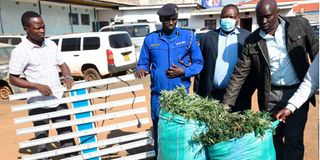Review policy to address the youth drug addiction menace

Security officers display confiscated bhang at Eldoret Police Station. According to the World Health Organization, more than half of the people who use drugs in Kenya are 10-19 years of age.
What you need to know:
- According to the World Health Organization, more than half of the people who use drugs in Kenya are 10-19 years of age.
- The drug-related cases that have been heard and concluded by the courts rose by 44 per cent from 2016 to 2018.
- This is why we need to advocate evidence-based legislation and public health methods that are effective in combatting drug abuse in Kenya.
Drug use is a growing problem in Kenya. Young people are now more exposed to substances such as heroin, cocaine and marijuana aka bhang aka shash than ever before.
According to the World Health Organization, more than half of the people who use drugs in Kenya are 10-19 years of age.
The drug-related cases that have been heard and concluded by the courts rose by 44 per cent from 2016 to 2018.
This is why we need to advocate evidence-based legislation and public health methods that are effective in combatting drug abuse in Kenya.
The law on narcotics ignores the connection between public health and drug use and instead implements punitive measures which have no history of effectiveness.
Updates in the law seem to target people of lower economic status by increasing fines, in some cases more than 20 times. This puts low-income individuals in jail at disproportionate rates.
These harsh measures should be replaced by interventions that humanise people who use drugs and offer treatment, which prisons do not have the capacity to provide.
After all, inherent dignity and respect is a constitutional right. Without rehabilitation, people who use drugs are trapped in an endless cycle, which prison only exacerbates.
In fact, trafficking 1.0 gm of narcotics in Kenya attracts the same prison sentence as attempted murder.
Kenya already works with the UN to implement Medically Assisted Therapy for problematic drug use. The Ministry of Education also introduced the National Guidelines for Alcohol and Substance Use Prevention and Management in Basic Education Institutions in 2021.
These examples highlight the desire for comprehensive treatment and education in Kenya that legislation needs to reflect.
The law as it stands hinders donors and other agencies from helping drug users as it obligates all people to provide information on any punishable acts, thus intensifying animosity and fear on both sides.
In order for harm reduction to work, we need a combination of national policy, community programmes and personal practices.
Ms Apondi is a consultant in research and drug policy.



